By Joel Tolman, Director of Impact & Engagement
I wasn’t sure what to expect when I stepped into Heather Nielsen’s first period class last week. I knew the room full of 11th graders was gearing up for the SAT, and had heard that they were feeling the stress of this test. This makes sense: the SAT still holds significant sway on these students’ post-high school choices, as well as being the most weighty part of how Common Ground is measured as a public school.
But what greeted me in Junior Seminar didn’t feel like rote test prep, nor did the students look defeated in the face of a high-stakes test that often feels like it’s set up to beat them. In fact, the conversation was just starting to heat up. Ms. Nielsen and her students had paused mid-way through The Valedictorian, a short story by celebrated speculative fiction author N.K. Jemisin. Jemisin’s story — set in a future world where extraterrestrial beings have confined the remaining humans onto what feels very much like a reservation or concentration camp — asks some big questions about how young people are sorted and categorized, included and excluded, based on high-stakes tests and aspects of their identity that are beyond their control. Students were eager to grapple with these questions — guessing at the main character’s motivations and those of the humans and non-humans around her, predicting what will happen next, making connections to their own experiences. The room full of 11th graders was arrayed in two concentric U’s, and after turning to talk with their neighbor about these questions, responses tumbled out and built on each other from every corner of the room.
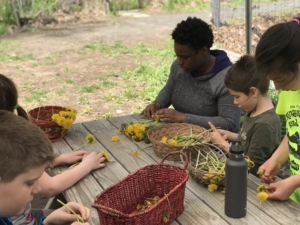
Alongside Junior Sem, 11th graders take courses ranging from Pre-Calculus, to Social Justice Theater, to Neuroscience, to Outdoor Leadership. DJ, who is passionate about education and the environment, has earned academic credit by interning in Common Ground’s Nature Year program.
The energy I saw in Junior Seminar last week was driven by Jemisin’s powerful short story — and is also connected to the larger narrative of the course, which has been building since September. Junior Seminar is the only course all 11th graders are required to take, which opens up lots of space for students to dive into electives, dual enrollment opportunities at local colleges, the math class that’s right for them, science options from AP Environmental Science to Neuroscience to Physics, internships, and more. As the only core junior course, it also plays a big role in supporting Common Ground’s goal that all students graduate ready for college and careers, leadership and life, on a path that reflects their passions.
Chapter 1: What do I want my life to look like?
“There are four units in Junior Sem,” explains Ms. Nielsen. “The first one is really about, ‘What do I want my life to look like? What sort of education will I need in high school and beyond to build that life?’ Students’ major performance task is a big career and college research paper — focused on what they are passionate about, and what education they need to get there. It’s an English class, so writing a research paper makes sense. We’re getting ready to go into their senior year of high school, where students will write a more significant research paper, and their college essays. This is a stepping stone to their capstone project.”
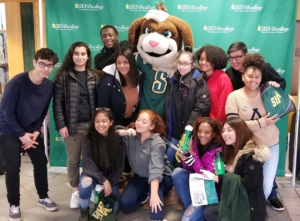
All juniors headed off campus for a college fair this fall — one of many opportunities to build the research base for their post-secondary plan.
For many juniors, this means telling a reality-based story that connects where they are now, to plans for college, to where they see themselves in the future. “It’s definitely a unique class, not like any that I’ve had before,” says Keely, one of the students who had a lot to say during the period one discussion of The Valedictorian. “We talked about our career and life goals, then learned about colleges and other educational options that can get us there. I’ve learned about colleges, and about how I’m going to pay for it — what I need to do now to qualify for scholarships later.”
The class, like all of Common Ground, aims to convince all students that they are college material, and to build the skills that students need to succeed in college. There’s strong evidence that this strategy is working. In each of the last five years, between 97 and 100% of Common Ground grads earned admissions to college. In last year’s graduating class, 83% of seniors enrolled in college in the fall after graduating. Statewide, by comparison, 71% of high school students enroll in college in the year after graduation.
At the same time, Junior Sem encourages students to think critically about what next step is right for them, and celebrates whatever path they choose. “I want to go into a trade — carpentry, cosmetology, plumbing, or electricity,” says Andy Cole, another junior. “I like that all those things are hands on, and that you earn a good salary. I learned that, to go to Porter and Chester Institute, I need to complete high school. I know how much it costs to go there, and what it takes to get in.”
Chapter 2: Education Is A System of Power
Once students are grounded in their own passions and pathways, they turn to look at the system that’s meant to help them get there — and that often creates barriers between them and their dreams. “I want students to understand that education is a system of power, that language is a system of power. That helps them understand the context for this test, the SAT. Education justice is going to drive this class, because it’s my background, and because it speaks to what students are experiencing every day.”
For many students, understanding where the SAT comes from, and exploring how power works within the education system, helps them build their own power. “We learn why the SAT was created, the history behind it,” explains DJ, another student in the class.
Keely adds, “It’s good to know — even though it’s a really important test, it’s still a BS test. It makes it seem a little less stressful. It doesn’t feel like you’ll die if you don’t get a 1600, you just need to know how to play the game.”
Chapter 3: You Can Beat This Test
In December, students turn to the SAT itself. Students set goals, and see feedback on their progress toward these goals. They practice parts of the test, and — more importantly — build skills they will need for success in college and beyond, which also happen to align with the test. “By that point, students are driven by their own internal passion — and by their desire to beat this test, subvert the system that’s meant to beat them. They focus on the self first, then on the system, and then on how they can beat and help transform that system — it gets them really motivated. They’re also excited to see how they’re growing.”
As the discussion of N.K. Jemisin’s story illustrates, this part of the course feels like a lot more than test prep. Students also read from Alejandro Zambra’s book, Multiple Choice, a work of fiction written entirely in the form of a standardized test. “This is students’ core junior English course — and so the main focus is on helping them become more powerful readers and writers,” explains Ms. Nielsen.
Students seem to buy it, and feel supported and seen. “I personally don’t like testing, but I’m confident that I can do fine,” says DJ. “Between the PSAT and the practice SAT we took this month, I raised my score by 50 points. I hope I can keep going higher.”
“I like that the class is small,” says Andy, who is sometimes more successful out doing real work than in the classroom, but has made solid gains at Common Ground. “It’s challenging, but not too challenging.”
Chapter 4: Gaming The System
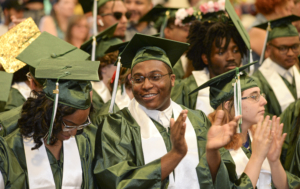
Junior Seminar is part of a school-wide commitment to make sure all students graduate ready for college and careers, leadership and life, on pathways to their passions. In each of the last 5 years, between 97 and 100% of Common Ground grads earned admissions to college.
The SAT behind them, the Junior Sem turns to something that students find much more intrinsically interesting and important. “The final unit focuses on gaming the system — how to ‘adult,’” explains Ms. Nielsen. “We come back to post-secondary plans we created in the fall, and talk about the non-academic skills they’ll need to thrive in life after high school. We talk about ethical post-secondary plans — how are your life choices going to change the system for the better? I’m also going to teach them personal finance, which I’m really excited about … What’s cheaper, living in a college dorm or off campus? What are the other pros and cons of taking out loans to go to school?”
Students light up when they start talking about life after the SAT, and after high school. “I’m excited about that,” says Keely. “I’d love to be learning the math behind taxes, and bills — it makes it real.”
Know a student who’s looking for an education that will get them ready for college and life? That will help them understand the system they live in and change the world? Common Ground’s lottery is open now! Learn more.

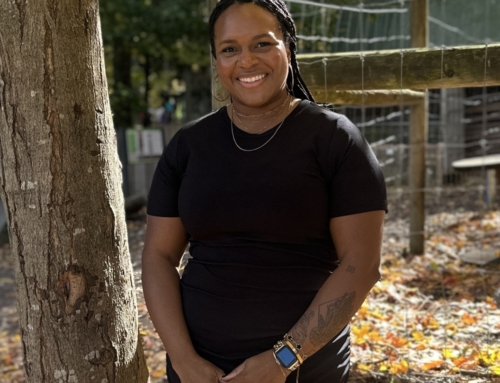
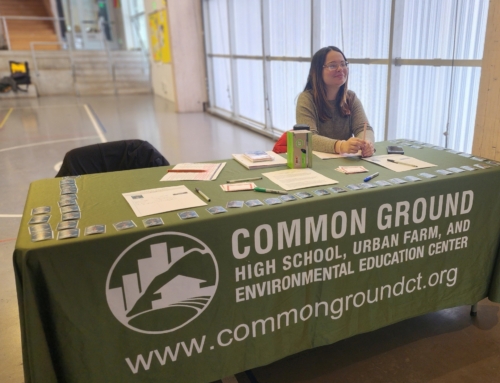
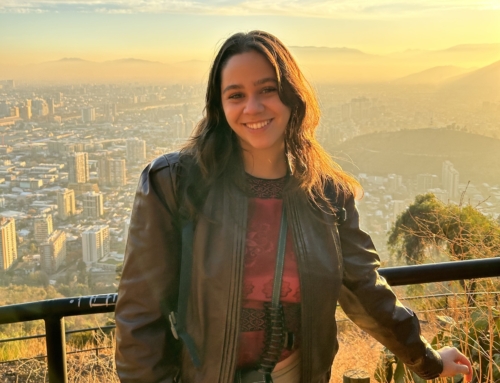
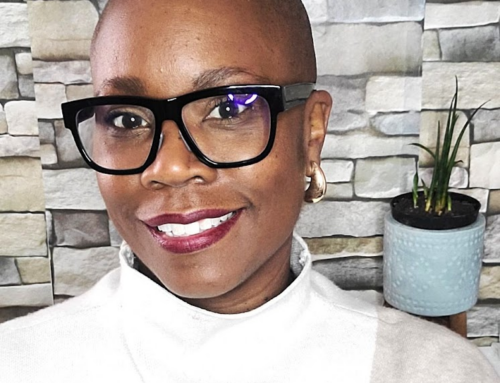
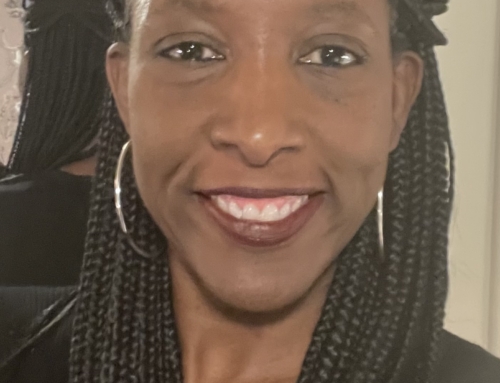
Leave A Comment